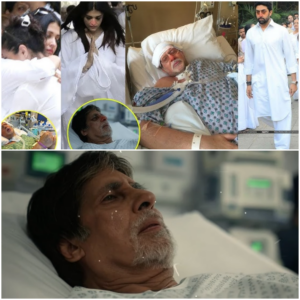Sad news for Deepika Padukone as Deepika Padukone Tried to Commit Su*cide in Depression at hospital!
.
.
.
Clarification Regarding Deepika Padukone’s Mental Health Struggles
In recent reports, some misleading and sensationalized headlines have emerged, claiming that Deepika Padukone attempted suicide while battling depression. These stories have spread quickly, causing confusion among her fans and the general public. It’s essential to address these claims and clarify the facts surrounding Deepika’s mental health journey.
Deepika Padukone, one of Bollywood’s leading actresses, has been very vocal about her mental health struggles, including battling depression. She has shared that her journey toward understanding and managing depression started in 2014, when she fainted during a routine work engagement. This was when she realized she had been struggling with depression for a while. However, nowhere in her public statements has she claimed that she “attempted suicide,” as some recent reports have suggested.
The Emotional Toll of Mental Health Struggles
In various interviews, Deepika has openly spoken about how overwhelming the weight of depression was. She admitted to feeling helpless and hopeless at times, saying that there were moments when she thought she “didn’t want to live.” These raw statements were not an indication of an actual suicide attempt but rather a reflection of the profound emotional struggles she was facing. Depression can make people feel as though there’s no way out, but expressing such feelings is not equivalent to attempting self-harm.
Deepika has explained how, despite having a successful career, family, and friends, she felt an intense emptiness. These feelings, she shared, were a result of untreated mental health issues. She emphasized that anyone could be battling mental health issues, even those who appear outwardly happy and successful. This is an important reminder that mental health struggles are often invisible and can affect anyone, regardless of their outward circumstances.
The Role of Family Support and Therapy
One of the most significant parts of Deepika’s journey was the support she received from her family, particularly her mother. Deepika has spoken about how her mother, who had come to visit her in Mumbai, noticed her distress and encouraged her to seek professional help. This moment of intervention proved to be a turning point in Deepika’s recovery. With her mother’s encouragement, she began seeing a psychologist, a decision that helped her begin to heal.
Deepika’s story highlights the importance of family support when dealing with mental health challenges. It’s a powerful reminder that sometimes, it takes a loved one recognizing the signs of distress to help someone take the first step toward recovery.
The Stigma Around Mental Health in India
In India, mental health is still a sensitive and often stigmatized topic. Many people feel ashamed or hesitant to discuss their mental health struggles due to societal pressures and misconceptions. Deepika, however, has consistently used her platform to speak out against this stigma. She has urged others to break their silence and seek help, emphasizing that mental health should be treated with the same importance as physical health.
Her journey has helped to spark conversations about mental health in a country where many people have traditionally kept their struggles hidden. By sharing her story, Deepika has made a significant impact on reducing the stigma surrounding mental health in India and encouraging others to take their well-being seriously.
The Misinformation in Recent Reports
While Deepika’s openness about her battle with depression has been instrumental in raising awareness, recent reports have spread false narratives about her personal experience. One of the most concerning pieces of misinformation is the claim that she attempted suicide while in a hospital. These reports have been taken out of context and misinterpreted. Deepika has never publicly stated that she made such an attempt. What she has shared are the emotions of despair and hopelessness that she faced during her darkest moments—a sentiment that is common among individuals struggling with depression.
This kind of sensationalized reporting does a disservice to the issue of mental health, as it can create unnecessary alarm and misunderstanding. It’s important to emphasize that feeling hopeless or suicidal doesn’t always translate into an attempt to take one’s life. Depression is a complex mental illness that requires understanding, empathy, and proper support, not misrepresentation.
The Importance of Accurate Representation
As a public figure, Deepika Padukone’s decision to speak openly about her mental health struggles was brave and impactful. However, with this openness comes the responsibility of the media and the public to report her story accurately. Misleading or sensationalized headlines about mental health can perpetuate harmful myths, discourage people from speaking out, and hinder progress in addressing the stigma surrounding mental health.
It’s crucial that the media focuses on the empowering aspects of Deepika’s story—how she sought help, how therapy played a vital role in her recovery, and how she uses her platform to raise awareness. The conversation should be about breaking the silence surrounding mental health and creating an environment where seeking help is encouraged, not shamed.
Moving Forward: Advocating for Mental Health Awareness
Deepika’s openness has been invaluable in starting a much-needed conversation about mental health, especially in a country where the topic is often taboo. Her honesty has inspired many to seek help, recognize their own struggles, and start their own journeys toward healing.
It’s essential that we continue to support individuals who are open about their mental health journeys, just as Deepika has been supported by her family and her fans. We must create a more compassionate society where mental health is prioritized, and those struggling are not judged but uplifted.
As we move forward, it’s also crucial to be mindful of how we consume and share information, particularly regarding sensitive topics like mental health. Let’s ensure that we continue to approach these conversations with accuracy, empathy, and care.
Conclusion
In conclusion, while recent reports about Deepika Padukone’s mental health have sensationalized her experiences, the truth remains that she has been a brave advocate for mental health awareness. Her battle with depression was real, but it was not an attempt to end her life—rather, it was a struggle to survive, heal, and recover. By sharing her story, Deepika has not only helped herself but also countless others who may be dealing with similar issues.
As a society, we need to continue supporting individuals who are open about their mental health challenges, working together to create an environment that fosters understanding, support, and healing. Deepika’s journey is an inspiring reminder that, with the right help and support, it is possible to overcome even the darkest of times.
News
Tamanna Bhatia shares early morning bedroom moment with husband Salman Khan in Maldives
Tamanna Bhatia shares early morning bedroom moment with husband Salman Khan in Maldives . . . Tamanna Bhatia Shares Early Morning Bedroom Moment with Husband Salman Khan in Maldives: A New Chapter in Their Love Story After facing multiple heartbreaks…
Tamanna Bhatia FIRST RASOI delicious dish impressed to husband Salman Khan after wedding
Tamanna Bhatia FIRST RASOI delicious dish impressed to husband Salman Khan after wedding . . . Tamanna Bhatia’s First Culinary Experience in the Khan Family: A Heartwarming Gesture Towards Husband Salman Khan Tamanna Bhatia, the beautiful and talented actress who…
Very Sad News for Aishwarya Rai as Amitabh Bachchan Pass was in critical condition at hospital!
Very Sad News for Aishwarya Rai as Amitabh Bachchan Pass was in critical condition at hospital! . . . Amitabh Bachchan’s Health Crisis: Fans Express Concern After Cryptic Social Media Post Bollywood legend Amitabh Bachchan, whose illustrious career has spanned…
Shocking! Hina Khan got Married to boyfriend Rocky Jaiwal after Recovering from her Stage 3 Cancer
Shocking! Hina Khan got Married to boyfriend Rocky Jaiwal after Recovering from her Stage 3 Cancer . . . Hina Khan and Rocky Jaiwal: A Journey of Love, Strength, and Resilience Leading to Their Upcoming Wedding Announcement In a heartwarming…
❤️🩹❣️ Deepika Padukone and Ranveer Singh with their adorable daughter in their latest photo!
❤️🩹❣️ Deepika Padukone and Ranveer Singh with their adorable daughter in their latest photo! . . . Deepika Padukone and Ranveer Singh Share Heartwarming Moment with Their Adorable Daughter in Latest Photo Bollywood’s power couple, Deepika Padukone and Ranveer Singh,…
Shocking! Deepika Padukone Tried to Comit Su*cide in Depression after Dua Padukone
Shocking! Deepika Padukone Tried to Comit Su*cide in Depression after Dua Padukone . . . Clarification of Misinformation Regarding Deepika Padukone and Her Mental Health Journey In recent days, several inaccurate reports and misleading headlines have been circulating about Deepika…
End of content
No more pages to load







